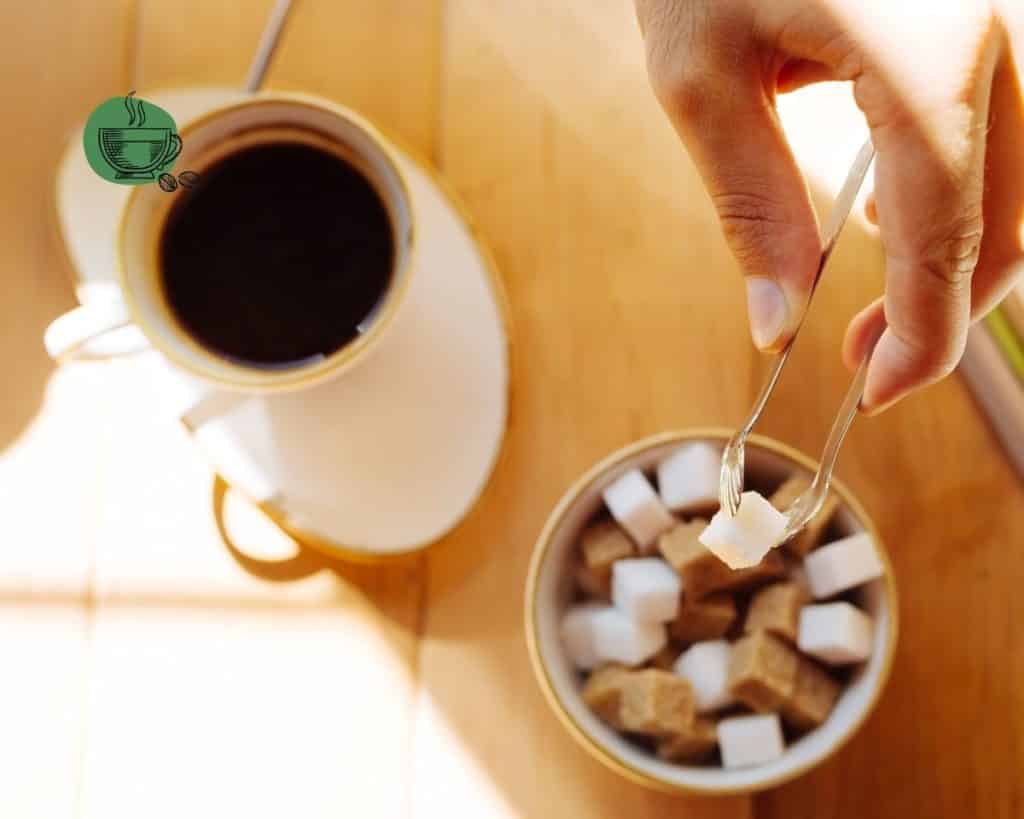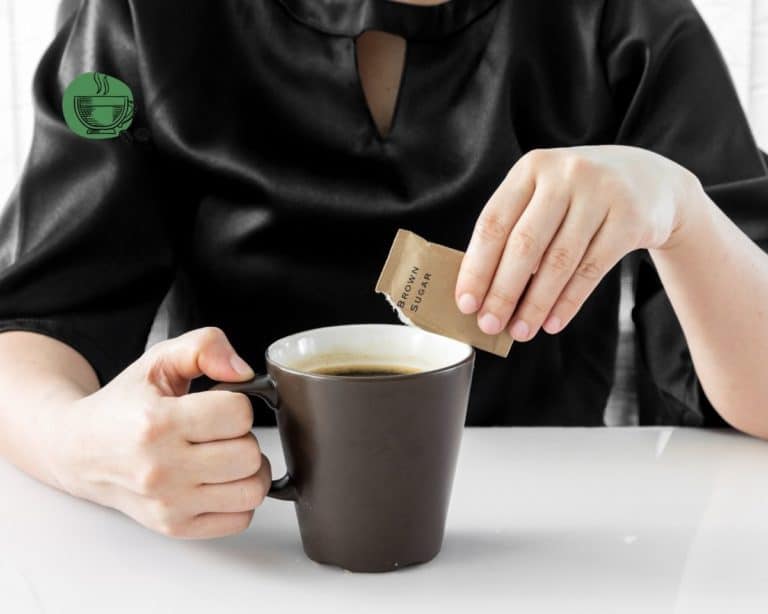Do you put sugar in espresso? Well, if you love your coffee sweet, you’re in good company. About 50% of coffee drinkers in America do (1). If you sweeten your coffee with sugar- tune in to find out if brown sugar in coffee is better than white coffee.
According to a survey from 2019 by NCDT(1), 38% of coffee drinkers use sugar as their go-to sweetener. In recent years, we have heard a lot about the health benefits of brown sugar over white sugar. But is brown sugar better as a coffee sweetener, or is it just different? While you can use either, there are some differences you should consider.
In this post, we’ll discover the differences between brown and white sugar to help you decide what you put in your coffee.
Skip to the best part:
Brown Sugar vs. White Sugar
Brown and white sugar take the top tier of the most common sugar varieties. That’s why a comparison of the two is in order. Fundamentally, there are four aspects to look at when comparing the two. They include nutritional elements, production methods, cooking uses, and color and flavor.
Nutritional Elements
Let’s start with understanding the nutritional elements of both brown and white sugar.
Regarding nutritional value, brown sugar is known to have slightly more nutritional contents than white sugar. The nutritional contents are potassium, calcium, and iron.
Essentially, brown sugar is a combination of white sugar and molasses. It’s the molasses that give brown sugar its dark color and also increase its nutritional content slightly. However, it’s imperative to note that the difference in nutritional value between brown and white sugar is minimal. Thus, we can’t say that brown sugar is a rich source of minerals and vitamins.
Something else that will interest you about brown sugar is that it contains fewer calories than white sugar, but the difference is insignificant. To be precise, a teaspoon of brown sugar contains 15 calories, while a similar amount of white sugar contains 16.3 calories.
Production Process
Sugar comes from sugarcane and sugar beet. Both of these plants go through the same process in sugar production. But, the methods used to transform the sugar into either white or brown are different.
The first step in sugar production is extracting, purifying, and heating the sugary juice from sugarcane or sugar beet to produce molasses. Simply put, molasses is a concentrated syrup.
The next step is transforming the crystallized sugar into sugar crystals. A machine (a centrifuge) separates sugar crystals from molasses. After this procedure, sugar is processed further to eliminate left-over molasses and make the crystals smaller. It is from this that the sugar crystals are then filtered to make white sugar.
On the other hand, brown sugar is white sugar combined with molasses. Unlike white sugar, unrefined brown sugar goes through minimal processing during the processing phase. The minimal refining helps brown sugar maintain a significant amount of molasses and its brown color.
Cooking Uses
White and brown sugar are used for culinary purposes in different ways. Brown sugar is known for its ability to retain moisture. Foods cooked using brown sugar are usually softer and denser. On the other hand, white sugar leads to a rising effect. Therefore, white sugar is a better option for foods that need a certain level of rising.
Color and Flavor
Color and flavor are other significant differences between white and brown sugar. Just like the name itself, white sugar is light-colored in nature, while brown sugar has a dark color.
White sugar has a sweeter flavor compared to brown sugar. If you’re adding white sugar to coffee, you should add less amount than brown sugar to have your desired taste. If you add too much white sugar, your cup of coffee may be too sugary to drink. On the contrary, brown sugar has a caramel flavor because of the molasses added to it. If you want coffee with a deep, caramel flavor, brown sugar is the right choice.
Is Brown Sugar Better Than White Sugar?
The question of whether brown sugar is better than white sugar is worthy of a discussion. The premise of this question stems from the idea that taking white sugar has adverse effects.
Much has been said about white sugar that makes brown sugar look too good compared to the former. So, which one is better between the two? Well, it depends on how you want to look at it.
Some people may decide to view the question from a health perspective. Others may want to look at it from their experience when making coffee. From a health perspective, there is not much difference between the two. Truthfully, brown sugar has a fewer quantity of calories compared to white sugar. But the calorie difference between the two is minimal. From a nutrition point of view, this is a slight difference that doesn’t make a huge difference. For a person conscious of the number of calories consumed, taking brown sugar in coffee can be motivated by the fact that it has fewer calories than white sugar.
The other way of looking at this subject is the experience of taking coffee that white and brown sugar gives. So, in terms of which one is better between white and brown sugar, it depends on the flavor you prefer in coffee.
Basically, white sugar is sweeter than brown sugar. On the other hand – you can expect a deep, caramel flavor when you take your cup of coffee with brown sugar. If you’ll like a caramel flavor in your coffee, brown sugar is the option you should go for.
So, Which Sugar is Best with Coffee?
One of the questions that linger in the minds of coffee lovers is which sugar is best with coffee. Well, when it comes to the traditional varieties of sugar, there are three that come to mind. There is raw sugar, white sugar, and brown sugar. Each of these sugars contains distinct features that differentiate itself from the rest.
It’s important to highlight that different people prefer either of the sugars for various reasons. So, the short answer to this question is that it depends on the preferences of an individual coffee lover.
Raw sugar has thicker granules. If you take this variety of sugar, you’ll notice that it has a lighter taste than brown sugar.
On the other hand, white sugar is finely refined. It goes through a thorough processing procedure to give it heavily fine crystals. It is the sweetest of the sugar varieties. If you want sweet coffee, you can use white sugar. Something else about white sugar is that it will dissolve quickly.
Brown sugar has a unique flavor compared to raw and white sugar. It’s a distinct taste profile that’s noticeable with ease. In other words, you’ll have more than just a sweetening in your coffee when using brown sugar.
So, the bottom line is that you can use any of the sugar varieties in coffee. Depending on your preference, you can use the one that meets your needs. For example, if you want sugar that adds a caramel flavor to your cup of coffee, you should go for brown sugar.

Can You Put Brown Sugar In Coffee?
Yes. It is possible to put brown sugar in coffee. In fact, there are coffee lovers who prefer brown sugar to white sugar. If you’ve never used brown sugar in coffee before, you may switch to it after sampling it.
Regarding flavor, brown sugar has a deeper flavor than white sugar. This is one of the reasons why a good number of coffee lovers prefer to use brown sugar. For brown sugar, it’s more than just making coffee sweet. It’s about adding a unique, deep, caramel essence to your cup of coffee. Also, the fact that it is slightly healthier makes it a great option. Therefore, it is a great idea to put brown sugar in coffee with these qualities.
What Are the Benefits of Brown Sugar in Coffee?
The taste of brown sugar in coffee is much more mellow than white sugar, and it also has a richer flavor. Brown sugar provides more depth to the coffee. It can be used to make some interesting variations on your favorite drink.
Some think adding brown sugar to coffee may improve its health benefits. As we saw earlier, brown sugar does contain trace amounts of minerals such as potassium and magnesium, which are considered good for the heart. However, the nutrition differences between white and brown sugar are minimal, and I don’t think any physician would recommend consuming either…
Alternatives to Sugar for Your Coffee – How to Sweeten Coffee without Sugar
You don’t have to use sugar to sweeten coffee. There are alternatives to sugar for your coffee that will interest you. Here are the other options you can consider using instead of brown or white sugar:
- Stevia – Stevia originates from South America and Central America. The sweetener is extracted from the Stevia Rebaudiana plant. One of the significant features of this sweetener is that it has no calories. Also, it does not have additional carbohydrates. These features make it a feasible choice of sweetener for persons with diabetes.
- Maple Syrup – The original place of maple syrup in Canada. It is from the sap of maple trees that this sweetener comes. It is known to be an extra sweet sweetener. Though it is considered to have a high level of calories, it is known to have significant nutritional value. It contains high levels of manganese, a valuable mineral for strengthening bone health. Other nutritional elements present in maple syrup include zinc, potassium, iron, calcium, and copper.
- Coconut Sugar – Coconut sugar comes from the sap of the coconut tree and is a popular sweetener for vegans. Coconut sugar does not go through heavy processing. It is known to have many beneficial nutrients, such as zinc, potassium, calcium, and iron.
- Honey – Honey is a common alternative to sugar. It contains nutrients that sugar does not have. Some of the nutrients are iron and zinc. Another nutritional benefit of taking honey instead of sugar is that it has antibacterial and anti-inflammatory features.
- Jaggery – This is a popular non-refined sweetener, common in Africa and South-East Asia. Jaggery contains iron, magnesium, potassium, calcium, phosphorus, and magnesium. It is extracted from sugarcane or from the toddy palm trees. Take note that you should avoid taking excess jaggery.
Brown sugar in coffee – Conclusion.
About 50% of coffee lovers like taking coffee in its sweet state. If you are adding sugar to your coffee, there are not many nutrition differences between brown and white sugar.
Many of our readers love high-quality perfect tasting coffee. We own espresso machines and are very picky when it comes to our coffee beans. This is why the central aspect you should remember when considering brown vs. white sugar is the taste.
Remember, white sugar is sweeter, while brown sugar has a more distinct caramel flavor. So in the end, it all comes down to personal preferences.
If you are watching your diet – there are quite a few alternatives to sugar that might be less harmful to your body. Still, I guess that the best avoiding sugar and other sweetening substances in your coffee is the best choice.
Sources:
(1) “The Consumer Coffee Cup“, Emily Refermat, Vending Market Watch.



